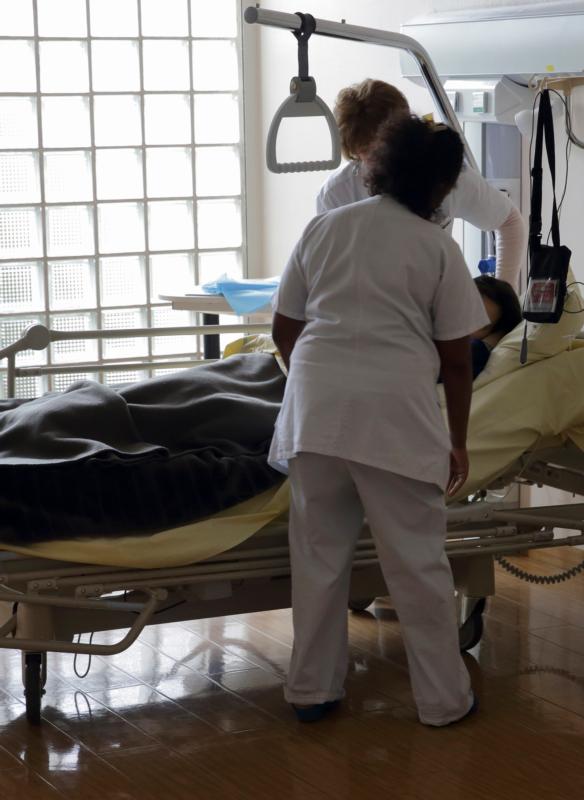
Nurses provide care to a patient in the palliative care section of a hospital. As euthanasia becomes legal in Australia’s Victoria state, the state’s bishops said Catholic health care services will not cooperate with the facilitation of suicide. (CNS photo/Philippe Wojazer, Reuters)
MELBOURNE, Australia (CNS) — As euthanasia becomes legal in Australia’s Victoria state, its bishops said Catholic health care services will not cooperate with the facilitation of suicide.
“We cannot cooperate with the facilitation of suicide, even when it seems motivated by empathy or kindness,” Archbishop Peter Comensoli of Melbourne, Bishop Paul Bird of Ballarat, Bishop Patrick O’Regan of Sale and Bishop Leslie Tomlinson of Sandhurst said in a June 14 pastoral letter.
The Voluntary Assisted Dying Act takes effect June 19 in Victoria. Any resident of the southeastern state over 18, with a terminal illness and with less than six months to live can request a lethal dose of medication under the new legislation.
“All of us who hold a principled opposition to euthanasia are now, in effect, conscientious objectors,” the bishops said.
“These words will sound hard to hear, but as pastors” of Victoria’s dioceses “we feel a responsibility not just to say ‘no’ to VAD, but to give every encouragement to model a way of life” that renders euthanasia unnecessary, they said.
Catholic hospitals and Catholic residential care organizations “have shown great courage” and “have united to find ways to model excellent care for their patients, and are committed to resisting calls to involve themselves” in assisted dying, they said.
The bishops said they objected to state-sponsored practices that facilitate suicide and “the lack of adequate funding for excellent palliative care.”
“Most of all, we object to the lazy idea that the best response our community can offer a person in acute suffering is to end their life,” they said.
[hotblock]
“We are called to engage with our Victorian communities with friendship and wisdom, not motivated by fear,” the bishops said, noting that “we hold no animosity for those with whom we disagree.”
“We do not consider that the prescription of a lethal substance to a person to help them end their own life, nor the administration of a lethal substance to a person by a health practitioner to end their life, are part of end-of-life care,” Catholic Health Australia said in a statement.
Therefore, “our services will neither provide nor facilitate” assisted dying, it said.
The Catholic group’s members provide about 10 percent of the country’s hospital-based health care and 20 percent of its home care and support for the elderly.
“Our staff have always had open discussions with patients, residents and families, including about their treatment and care at the end of life. That will not change,” it said.
“Each of our services has a system in place that will respond respectfully and compassionately to any questions” about the new law.
“This includes coordinating transfer of care to other providers if a patient/resident wishes to seek VAD,” the group said, noting that “we will not impede access to the provision of VAD elsewhere.”
Catholic Health noted its concern at “the lack of adequate and timely access to excellent palliative care in Victoria” and urged the government to expand these services, particularly to those in rural areas.
“When our patients are dying, we assist them to die in comfort and with dignity,” the group said, noting that its health care providers “withdraw life-prolonging treatments when they are medically futile or overly burdensome or when a person wants them withdrawn.”
[hotblock2]
The bishops said that some of “the loudest voices, including some members of the Victorian Parliament, have called VAD a ‘compassionate’ response to suffering, and those who oppose VAD have been accused of lacking compassion.”
Pope Francis “has encouraged ordinary Catholics everywhere to resist euthanasia and to protect the old, the young and the vulnerable from being cast aside in a ‘throw-away culture,'” the bishops said.
Christians in Victoria “are challenged to show a different approach to death and the dying; one which accompanies every person as they are dying and allows them to love and to be loved to the very end,” they said.
“We will not abandon those we love, and we believe they have a right to be loved from the beginning to the end of their life,” they said.
Assisted dying remains illegal in Australia’s other five states.
PREVIOUS: Maronite bishops urge repatriation of Syrian refugees from Lebanon
NEXT: Quebec government passes Canada’s strictest secularism bill



Share this story